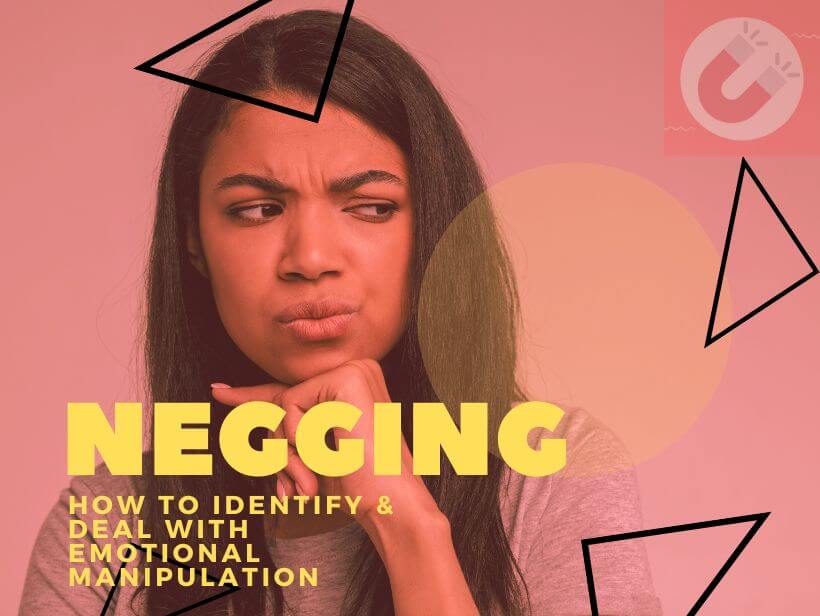To maintain healthy relationships and personal well-being, it’s essential to be aware of toxic traits. Toxic traits are behavioral patterns that can negatively impact how we interact with others and our own emotional health.
This guide will help you identify and understand these toxic traits, not just in others, but also within yourself.
How Can I Recognize Toxic Traits in Myself?
Recognizing toxic traits in oneself requires self-awareness and honesty. Start by reflecting on your interactions with others and your personal behavior patterns. Ask yourself whether your actions could be causing distress or harm to those around you. Are you often involved in conflicts or do you find that your relationships are strained?
Consider seeking feedback from someone you trust and be open to constructive criticism and use it as an opportunity for growth. Familiarize yourself with common toxic traits and assess whether any resonate with your own behaviors. Mindfulness practices can also help you become more aware of your thoughts and actions in real-time, allowing you to recognize and adjust negative behavior patterns as they occur.
How Can I Identify Toxic Traits in My Relationships?
To identify toxic traits in your relationships, it’s important to reflect on interactions and recognize patterns that make you feel uncomfortable, undervalued, or disrespected. Toxic traits can manifest as consistent negativity, manipulation, lack of empathy, or disrespect for boundaries. Pay attention to how you feel during and after interactions with others. If you often feel drained, belittled, or anxious, these can be indicators of toxic dynamics.
Consider seeking feedback from trusted friends or family who may observe your relationships from an outside perspective. They can offer insights into behaviors you might overlook. Being aware of the common toxic traits listed previously can also help you pinpoint specific behaviors that are harmful to your well-being and relationships.
What Is Considered A Toxic Trait?
Toxic traits are persistent behavioral patterns that can harm others, negatively impact how we interact with others, and be destructive to our own best interests, relationships, and emotional well-being.
These traits can manifest in various ways, but they often share these key characteristics:
1. Harmfulness
They cause significant damage to relationships and emotional distress to others.
2. Recurrence
They are not isolated incidents but rather repeated patterns of behavior.
3. Negativity
They are fueled by negative emotions such as anger, resentment, or manipulation.
4. Lack of empathy
They demonstrate a disregard for the feelings and needs of others.
5. Dishonesty
They often involve deceit, lying, or withholding information.
Here are some examples of toxic traits:
- Emotional manipulation: Using guilt, fear, or obligation to control others.
- Dishonesty: Lying, cheating, or withholding information.
- Negativity: Constant criticism, complaining, or pessimism.
- Disrespect: Belittling, interrupting, or speaking rudely to others.
- Lack of accountability: Blaming others or refusing to take responsibility.
- Entitlement: Expecting special treatment or privileges without justification.
- Jealousy: Possessiveness, insecurity, or suspicion towards others.
- Controlling: Trying to dominate others and dictate their actions.
1. Emotional Manipulation Techniques
Emotional manipulation techniques are strategies used to control and exploit others emotionally. They can be subtle and hard to recognize, but they can cause significant harm to relationships.
Gaslighting
Gaslighting is a form of psychological manipulation where a person causes another to question their own sanity, perception of reality, or memories.
Emotional Blackmail
Emotional blackmail is a form of manipulation where a person uses guilt, fear, and obligation to control others.
Manipulation of Truth
Manipulation of truth involves distorting facts to suit one’s own narrative, often leading to confusion and mistrust.
Projecting Insecurities
Projecting insecurities involves attributing one’s own insecurities or flaws onto others, often as a defense mechanism.
Passive Aggressiveness
Passive aggressiveness is an indirect way of expressing anger or resentment. It can involve non-verbal expressions like sulking, procrastination, or purposeful failure.
2. Dishonest Behaviors
Dishonest behaviors are actions that can include deceit, lying, or withholding the truth, and over time they will significantly damage trust in a relationship.
Lying
Lying is the act of telling an untruth or half-truth with the intent to deceive or mislead another person.
Cheating in a Relationship
Cheating involves engaging in emotional or physical intimacy with someone other than one’s partner, violating the agreed-upon norms of the relationship.
Spreading Rumors
Spreading rumors is the act of circulating unverified information about someone, which can damage reputations and trust.
Intellectual Dishonesty
Intellectual dishonesty is the process of bending facts and ideas for personal gain, often to win an argument or to deceive.
Withholding Information
Withholding important information in a relationship can lead to a lack of transparency and trust, creating a divide between partners.
3. Negative Attitudes Towards Others
Negative attitudes towards others can manifest as disdain or a lack of compassion, which can create a hostile and uninviting environment.
Bigotry or Racism
Bigotry or racism involves intolerant attitudes or behavior towards individuals based on their race or ethnicity, leading to discrimination and prejudice.
Arrogance
Arrogance is characterized by an inflated sense of self-importance and superiority, often alienating others and inhibiting genuine connections.
Judgmental Attitude
A judgmental attitude involves making hasty and often negative assessments of others without full understanding or empathy.
Disrespectfulness
Disrespectfulness is a disregard for the feelings, wishes, rights, or traditions of others, damaging interpersonal relations.
Lack of Empathy
Lack of empathy is the inability to understand or share the feelings of another, which can lead to insensitivity and emotional disconnect.
4. Harmful Social Interaction
Harmful social interactions are behaviors that negatively affect the dynamics within a group, leading to tension and conflict.
Gossiping
Gossiping involves talking about someone’s personal affairs without their consent, often spreading rumors or untruths.
Chronic Interruption
Chronic interruption is the habit of consistently cutting off others while they speak, which can be dismissive and disrespectful.
Aggression
Aggression refers to hostile or violent behaviors or attitudes that can be damaging and create a fearful environment.
Relational Aggression
Relational aggression is a type of manipulation where social connections are used as a weapon to harm someone’s reputation or social standing.
Dismissive Attitude
A dismissive attitude is when someone undervalues or disregards another’s thoughts or feelings, leading to feelings of insignificance.
5. Problematic Relationship Dynamics
Problematic relationship dynamics can create an unhealthy balance of power and emotional turmoil within a relationship.
Fear of Intimacy
Fear of intimacy is an apprehension towards emotional closeness that can prevent the development of a deep and meaningful connection.
Unwillingness to Forgive
An unwillingness to forgive can lead to the harboring of resentment and grudges, which can poison a relationship over time.
Victim Mentality
Victim mentality is a mindset where one consistently perceives themselves as the victim of circumstances, avoiding personal responsibility.
Overdependence
Overdependence in a relationship can lead to a lack of autonomy and can burden the partner with excessive emotional or practical demands.
Emotional Blackmail
Emotional blackmail is a repeat from the first section, indicating its pervasive nature in toxic dynamics, where one uses emotional pressure to control or manipulate their partner.
6. Self-Centered Behaviors
Self-centered behaviors are those that prioritize one’s own needs and desires at the expense of others’ well-being.
Egocentrism
Egocentrism is the inability to differentiate between one’s own perspective and that of others, often leading to a lack of understanding and compassion.
Narcissism
Narcissism is characterized by an excessive need for admiration and a lack of empathy for others, often resulting in exploitative relationships.
Need for Constant Attention
A need for constant attention can be draining for others and can stem from deep-seated insecurities or a desire for validation.
Self-Care Neglect
Self-care neglect is the failure to take care of one’s own basic needs, which can lead to burnout and affect one’s ability to maintain healthy relationships.
Seeking Spotlight
Seeking the spotlight involves a constant need to be the center of attention, often overshadowing others and their contributions.
7. Avoidance and Defensive Mechanisms
Avoidance and defensive mechanisms are strategies used to dodge confronting personal issues or conflicts, which can lead to unresolved problems and emotional distance.
Defensiveness
Defensiveness is a protective reaction to perceived criticism or attack, often preventing open and honest communication.
Blame Shifting
Blame shifting is the act of transferring responsibility for one’s actions onto someone else, avoiding accountability.
Emotional Avoidance
Emotional avoidance is the practice of steering clear of uncomfortable emotions by denying or suppressing them, which can stunt emotional growth and understanding.
Lack of Accountability
A lack of accountability is the refusal to take responsibility for one’s actions, which can erode trust and respect in a relationship.
Refusal to Acknowledge Personal Faults
A refusal to acknowledge personal faults is an unwillingness to admit mistakes or weaknesses, impeding self-improvement and conflict resolution.
8. Emotional Instability
Emotional instability refers to unpredictable and often intense emotional responses that can create a volatile and uncertain relationship environment.
Frequent Mood Swings
Frequent mood swings involve rapid and dramatic shifts in mood, which can be confusing and exhausting for others to handle.
Emotional Instability
Emotional instability, as a broader term, encompasses a range of unpredictable emotional behaviors that make it difficult to maintain a stable, trusting relationship.
Overreacting
Overreacting is the act of responding to situations with exaggerated emotions, often leading to unnecessary conflict and stress.
Oversensitivity
Oversensitivity is a heightened emotional response to criticism or perceived slights, which can lead to defensiveness and withdrawal.
Abuse
Abuse, in its many forms, is a severe toxic trait involving physical, emotional, sexual, or psychological harm to another person, which is never acceptable.
9. Controlling Behaviors
Controlling behaviors are attempts to dictate or dominate the actions and decisions of others, undermining their independence and self-worth.
Clinginess
Clinginess is an excessive need for closeness and reassurance, which can smother the other person and strain the relationship.
Intimidation
Intimidation is the use of threats, fear, or coercion to influence or control someone else’s actions or decisions.
Hypercompetitiveness
Hypercompetitiveness is an extreme competitive attitude that values winning over the well-being of others and the relationship itself.
Overbearing Jealousy
Overbearing jealousy is a toxic trait where one experiences intense jealousy and seeks to control their partner’s interactions and relationships out of insecurity.
Unrealistic Expectations
Unrealistic expectations involve demanding more from a partner or oneself than is fair or reasonable, leading to constant disappointment and pressure.
10. Negative Worldview and Pessimism
A negative worldview and pessimism can taint interactions with others and one’s outlook on life, leading to a cycle of negativity and unhappiness.
Constant Negativity
Constant negativity is the habit of focusing on the negative aspects of situations or people, which can be draining and demoralizing for those around.
Catastrophizing
Catastrophizing is the tendency to assume the worst will happen or to blow things out of proportion, creating unnecessary anxiety and fear.
Dwelling on the Past
Dwelling on the past involves a preoccupation with previous mistakes or regrets, hindering progress and the ability to live in the present.
Fearmongering
Fearmongering is the spreading of fear to manipulate others, often leading to a toxic environment filled with anxiety and mistrust.
Black and White Thinking
Black and white thinking is a cognitive distortion where things are perceived in absolute terms, without recognizing the nuances and complexities of situations.
11. Excessive Criticism
Excessive criticism is the persistent negative evaluation of someone’s actions or character, which can erode self-esteem and the foundation of trust in a relationship.
Perfectionism Imposition
Perfectionism imposition is the practice of expecting others to meet unrealistically high standards, often leading to stress and feelings of inadequacy.
Condescension
Condescension is an attitude of patronizing superiority, which can belittle and discourage others, harming mutual respect in relationships.
Hypercritical Judgment
Hypercritical judgment involves consistently finding and focusing on faults or mistakes, often without recognizing or acknowledging strengths or successes.
Sarcasm and Mockery
Sarcasm and mockery involve making fun of someone in a hurtful way, often disguised as humor, which can be belittling and disrespectful.
Fault-Finding
Fault-finding is a behavior where one habitually identifies and criticizes faults in others, often to a degree that is excessive and unconstructive.
12. Boundary Issues
Boundary issues can lead to feelings of violation and discomfort, as they involve a disregard for the personal space and limits of others.
Lack of Respect for Privacy
Lack of respect for privacy involves intruding on someone’s personal boundaries without consent, leading to feelings of intrusion and disrespect.
Invasiveness
Invasiveness is an overstepping of boundaries where one inserts themselves into areas of another’s life where they are not welcome or invited.
Lack of Boundaries
Lack of boundaries is a failure to establish and maintain clear limits in relationships, which can lead to enmeshment and codependency.
Clinging to Loss
Clinging to loss is an inability to let go of past relationships or grievances, which can impede current relationships and personal growth.
Exploiting Others
Exploiting others is taking advantage of someone else’s generosity, kindness, or vulnerability, often for personal gain at their expense.
13. Inflexibility and Rigidity
Inflexibility and rigidity in behavior and thought can prevent personal growth, create conflict, and make it difficult to adapt to new situations or perspectives.
Unwillingness to Compromise
An unwillingness to compromise shows a rigid adherence to one’s own ideas or desires without considering the needs or opinions of others.
Resistance to Change
Resistance to change is a tendency to reject changes in routines, relationships, or personal growth, which can stifle development and cause friction.
Strict Adherence to Rules
An excessive focus on rules or procedures at the expense of creativity, flexibility, and sometimes ethical considerations can be problematic.
Black-and-White Morality
Viewing moral issues without nuance leads to judgmental and often unfair assessments of others’ actions.
14. Communication Breakdown
A breakdown in communication is detrimental to any relationship as it prevents understanding and resolution of conflicts.
Stonewalling
Stonewalling is refusing to communicate or engage in conversation, effectively shutting down any possibility of resolving issues.
Invalidation
Dismissing or belittling the feelings and experiences of others makes them feel unvalued and misunderstood.
Overgeneralization
Making broad statements based on limited evidence can lead to misunderstandings and conflict.
Assuming Intentions
Attributing negative intentions to others without sufficient evidence often leads to mistrust and resentment.
15. Self-Sabotaging Behaviors
Sabotaging oneself through various behaviors can undermine personal achievements and lead to a cycle of failure and regret.
Procrastination
Continually delaying important tasks, which can undermine personal and professional achievements.
Self-Victimization
Consistently casting oneself as the victim in every situation to avoid taking responsibility for one’s actions.
Engaging in Risky Behaviors
Repeatedly engaging in behaviors that are harmful or dangerous, often as a way to cope with emotional pain or stress.
Neglecting Health
Ignoring physical or mental health needs, which can have serious long-term consequences for oneself and relationships.
16. Entitlement and Expectation
Entitlement and unrealistic expectations can strain relationships and create an environment of discontent and resentment.
Demanding Special Treatment
Expecting to be treated as more important than others, often leading to conflict and resentment.
Unrealistic Demands on Others’ Time
Consistently expecting others to prioritize one’s own needs over their own responsibilities or well-being.
Lack of Gratitude
Failing to show appreciation for others’ efforts or kindness, which can diminish the quality of relationships.
Expecting Perfection from Others
Holding others to an impossible standard, often leading to disappointment and criticism.
17. Emotional Neglect and Withholding
Emotional neglect and withholding can create a chasm in relationships, leading to a lack of intimacy and connection.
Emotional Withholding
Intentionally withholding affection or emotional support as a form of punishment or control.
Neglecting Emotional Needs
Failing to attend to the emotional needs of oneself or a partner, leading to a lack of intimacy and connection.
Disengagement
Pulling away from meaningful interaction, often as a way to avoid dealing with issues or as a passive-aggressive response to conflict.
Lack of Validation
Failing to acknowledge or validate the feelings and experiences of others, which can lead to feelings of isolation and insignificance.
What Steps Can I Take to Manage Toxic Traits in Myself?
Managing toxic traits within yourself begins with acknowledging that you have aspects of your behavior that are potentially damaging to others and your own personal growth. Reflect on your actions and consider how they may affect those around you. Seek professional help if you find it challenging to navigate these issues alone. Therapists can provide valuable insights and coping mechanisms.
Commit to establishing healthy boundaries, practicing self-care, and improving your communication skills. Educate yourself about toxic traits and be patient with yourself as you work to change these behaviors. Change is a gradual process that requires consistent effort and a willingness to grow. Remember, recognizing and addressing your toxic traits is a brave and crucial step towards bettering yourself and your relationships.
Why Is It Important to Establish Healthy Boundaries?
Establishing healthy boundaries is crucial because it helps maintain a sense of self and ensures that your needs and values are respected. Boundaries act as guidelines for how you allow others to treat you and how you interact with them. When boundaries are clear and honored, they create a safe space for genuine respect and mutual understanding in relationships.
Without healthy boundaries, you may experience feelings of being overwhelmed or taken advantage of, which can lead to resentment and emotional exhaustion. Boundaries not only protect you from negative influences but also foster a healthy balance in relationships, allowing for personal autonomy and interdependence.
What are the consequences of untreated toxic traits?
Untreated toxic traits can have far-reaching and profound consequences that affect not only personal relationships but also one’s overall quality of life. These consequences can manifest in various forms, from psychological to social repercussions.
Psychologically, individuals with unchecked toxic traits may experience heightened levels of stress, anxiety, and depression. They may also struggle with self-esteem and self-worth issues, as their behaviors often lead to negative feedback from their social environment. Socially, these traits can result in the deterioration of relationships, including estrangement from friends and family, difficulties in professional settings, and potential isolation. Over time, this can lead to a cycle of loneliness and a lack of support systems, which are crucial for emotional resilience and happiness. Moreover, toxic traits can also have physical health implications, as chronic stress and emotional turmoil can contribute to a wide array of health problems, including heart disease, high blood pressure, and weakened immune function.
Why is it important to practice self-compassion when addressing toxic traits?
Practicing self-compassion is crucial when addressing toxic traits because it provides the emotional support needed to engage in the challenging work of self-improvement. Recognizing that everyone has flaws and that personal growth is a journey can help individuals maintain motivation and resilience in the face of setbacks.
Self-compassion involves treating oneself with the same kindness and understanding one would offer a good friend. It allows for an acknowledgment of mistakes and shortcomings without harsh self-criticism, which can be paralyzing. With self-compassion, individuals are more likely to learn from their experiences and continue making progress. It also encourages a balanced perspective, helping to avoid extreme reactions to personal failures, such as giving up or engaging in self-destructive behaviors. Ultimately, self-compassion is a key component of emotional health that can support lasting change and a more positive outlook on life.
What steps can I take to improve my relationships if I have toxic traits?
To improve your relationships if you have toxic traits, begin by acknowledging the specific behaviors that are problematic and commit to changing them. Communication is key—open up to those you have relationships with and express your intention to work on your toxic traits. Apologize for past behaviors and ask for support as you embark on this journey of change.
Seek professional help if needed, such as therapy or counseling, to gain deeper insights into your behavior and learn coping strategies. Work on developing empathy and active listening skills to better understand and respect the perspectives of others. Practice patience and self-compassion, as change takes time and effort. Establish healthy boundaries and strive to maintain them, both for yourself and in your interactions with others. By taking these steps, you can foster a more positive environment in your relationships and contribute to mutual growth and understanding.
Embrace the Journey to Healthier Relationships by Transforming Toxic Traits
In navigating the complexities of relationships, recognizing and transforming toxic traits is essential. We’ve delved into the various forms these traits can take, from emotional manipulation to boundary issues, and provided insights into identifying and managing them both within ourselves and in our interactions with others. The path to healthier relationships is paved with self-awareness, open communication, and a commitment to personal growth.
Empower Your Interactions: A Recap of Key Insights on Toxic Traits
- Identify patterns of manipulation, dishonesty, and disrespect.
- Reflect on personal behaviors that may contribute to a toxic dynamic.
- Seek professional help to gain deeper understanding and strategies for change.
- Establish and respect healthy boundaries for personal well-being.
- Engage in self-care and effective communication to foster positive relationships.
Remember that managing toxic traits is a continuous journey. It involves learning, adapting, and being kind to yourself as you make the necessary changes. Encourage yourself to take these steps confidently, knowing that each effort brings you closer to the fulfilling relationships you deserve.
Step Toward Positive Change with Jaunty’s Guidance
Transforming toxic traits in relationships requires dedication and, at times, external support. Jaunty is here to offer that support by equipping you with the social intelligence and communication skills needed for your journey. Our philosophy is rooted in the belief that everyone has the potential to enhance their social life and interactions.
At Jaunty, we combine insights from psychology, neuroscience, behavioral sciences, and practical experimentation to make the art of people skills accessible to all. Whether you’re a professional, single, a leader, or simply someone looking to break free from the limitations of toxic traits, Jaunty’s social instructors are ready to guide you.
Partnering with a social skills coach can offer guidance on:
- Developing emotional intelligence to recognize and manage manipulative behaviors.
- Cultivating honesty and transparency in your interactions.
- Building respect and empathy towards others.
- Learning to communicate effectively without aggression or passive-aggressiveness.
- Understanding the importance of setting and respecting boundaries.
Don’t let the challenges of toxic traits in relationships hold you back from achieving your goals for personal connection and growth. Take control of your social well-being and embark on a transformative journey with Jaunty today.



